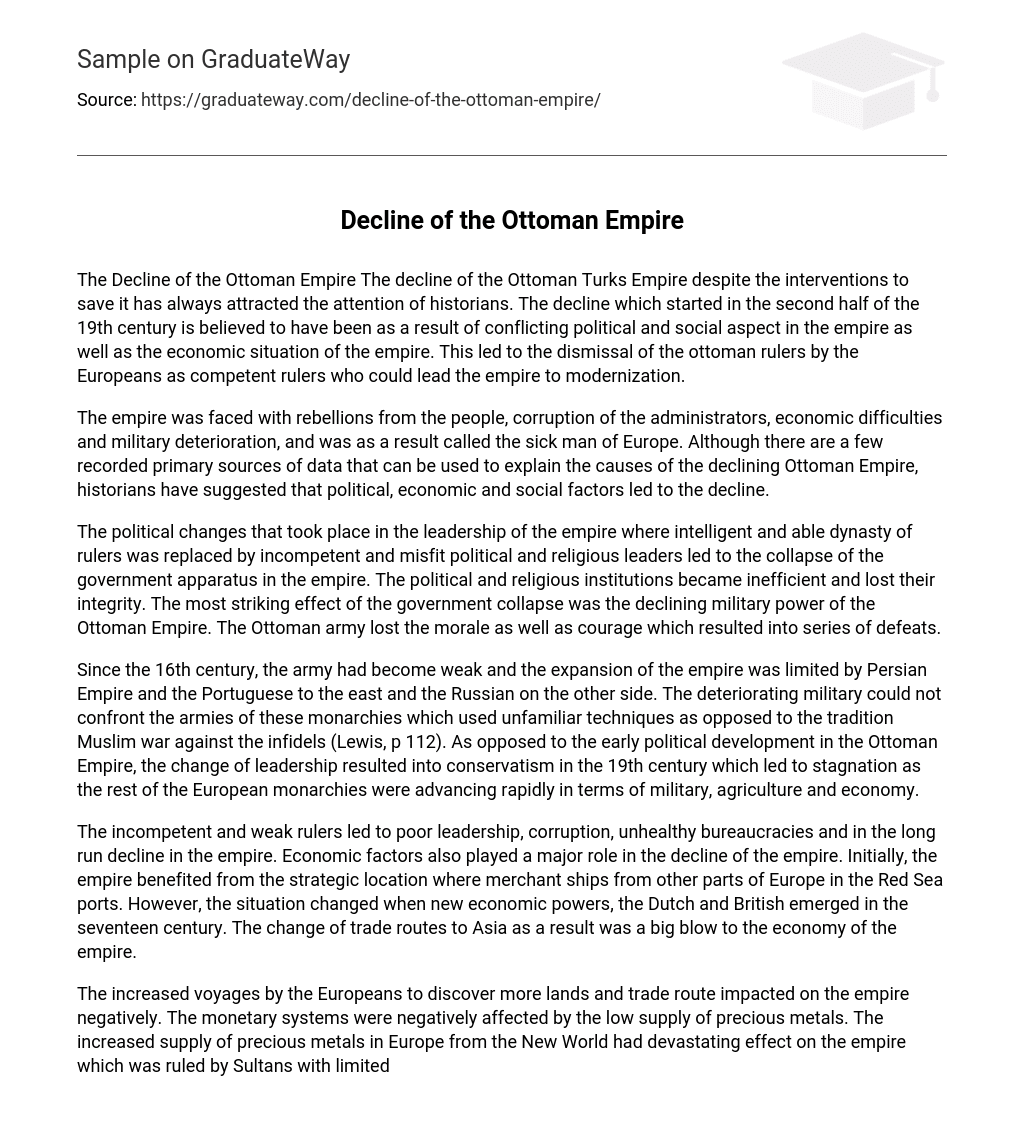The decline of the Ottoman Empire has been a subject of fascination for historians, in spite of attempts to halt it. This decline began in the latter portion of the 19th century and is thought to be caused by internal political and social conflicts within the empire, as well as its economic condition. Consequently, European powers regarded the Ottoman rulers as inept leaders incapable of modernizing the empire.
The Ottoman Empire faced rebellions from the people, corruption of the administrators, economic difficulties, and military deterioration. Consequently, it earned the title of the sick man of Europe. While there are limited primary sources available to comprehend the reasons behind the empire’s decline, historians argue that political, economic, and social factors were the primary contributors.
The Ottoman Empire went through a change in leadership, with capable and intelligent rulers being replaced by ineffective and unsuitable political and religious leaders. This resulted in a weakening and breakdown of the empire’s government apparatus. Both the political and religious institutions suffered from inefficiency and a loss of integrity. The most significant outcome of this collapse was the decline in military power for the Ottoman Empire. The Ottoman army experienced a decrease in morale and courage, leading to a series of defeats.
From the 16th century onwards, the Ottoman Empire experienced a weakened army and restricted expansion due to the Persian Empire and Portuguese in the east, as well as Russia. The declining military was unable to face these monarchies’ armies, which employed unfamiliar techniques compared to traditional Muslim warfare against non-believers (Lewis, p 112). In contrast to previous political developments in the Ottoman Empire, a change in leadership during the 19th century led to conservatism and subsequent stagnation, while European monarchies rapidly advanced in terms of military power, agriculture, and economy.
The empire’s decline can be attributed to ineffective and feeble rulers, resulting in inadequate governance, corruption, and inefficient bureaucratic systems. Economic factors also played a major role in its downfall. Originally, the empire prospered due to its advantageous location for trade with merchant ships from different parts of Europe at Red Sea ports. However, this favorable situation changed when the Dutch and British became new economic powers in the seventeenth century. As a result, the empire faced significant hardships as trade routes shifted towards Asia.
The empire was negatively impacted by the increased European voyages to discover new lands and trade routes. The supply of precious metals in the monetary systems also suffered due to this. Additionally, the empire, ruled by Sultans with limited financial knowledge, faced disastrous consequences from the increased supply of gold and silver from the New World. The decline of the empire was further caused by an economic crisis resulting from the newfound lands in America and Africa, as well as technical backwardness.
The worsening of the economic problem was due to the change in agrarian systems, resulting in decreased agricultural productivity (Lewis, p 120). The empire also lagged behind in technology, losing its market position to rapidly developing European nations in textile production and importation of species from Asia. Incompetent leaders resorted to their conservative Islamic beliefs, leading to the loss of control over the empire periphery by the late 19th century (Johnson, p 2). Additionally, the rebellions faced by the Ottoman Empire in the 18th century altered its military orientation.
Sultan Selim made efforts to strengthen the Ottoman military, but it was still unable to fend off the Egyptian attack. The sultan’s endeavor to modernize the military in a western style faced backlash from the conservative Islamic clergy, which resulted in the Balkan uprisings. According to Jaschke (p 12), one of the main factors contributing to the empire’s downfall was conservatism conflicting with nationalism. Unlike the thriving European nations, the Balkans did not comprehend the advantages of a nation state.
The empire became weakened in the early 19th century due to uprisings caused by the mistreatment of Serbs by the traditional military and political class. These uprisings were driven by the desire for autonomy. The empire’s weakness was further highlighted by its defeat at the hands of the Egyptians and the Russians (Johnson, p 3). In response to these challenges, the new rulers implemented mechanisms to address the underlying problems. They introduced social, political, and military changes that were influenced by European countries. These changes ultimately gave rise to the New Ottomans in the mid-19th century.
However, interventions were not timely enough and the new empire relied on the support of European powers (Johnson, p 4).
Work Cited
- Jaschke, Gotthard: “The Moral Decline of the Ottoman Dynasty” Die Welt des Islams, New Series, Vol. 4, Issue 1 (1955), pp. 10-14
- Johnson, Robert: “The decline of the Ottoman Empire, c. 1798-1913: Robert Johnson puts the decline of a once-great Empire into an international context. (The Unpredictable Past)”, History Review, (2005)
- Lewis, Bernard: Some Reflections on the Decline of the Ottoman Empire, Studia Islamica, No. 9 (1958), pp. 111-127





